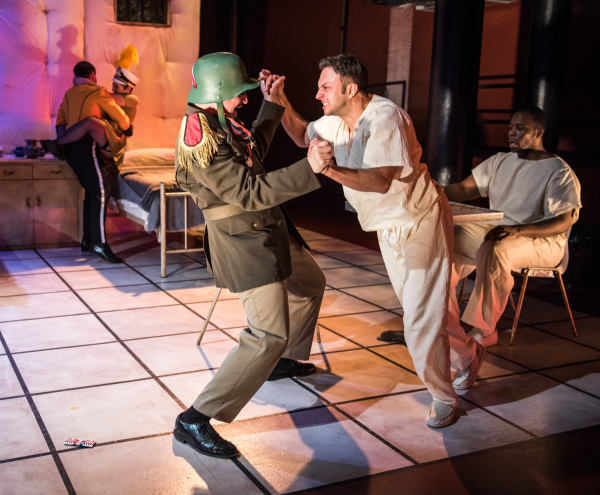Woyzeck, FJF

(© Russ Rowland)
Georg Büchner's Woyzeck is widely considered to be the first truly modern play. It influenced a generation of playwrights, expanding the franchise of theatrical subject matter to all rungs of society. Director Jeremy Duncan Pape and D.L. Siegel have adapted that timeless work into Woyzeck, FJF (with Büchner still credited as author) for the maiden voyage of No-Win Productions, a new theater company "interested in new and adaptive works that embrace humanity's struggle against obstacles that cannot be overcome." In the process, they seem to have created a few new obstacles with an auteurish take that does little to illuminate Büchner's original text.
Unfinished at the time of Büchner's death in 1837, Woyzeck exudes a stinging social critique and cruel brevity of language that predates the similar work of Bertolt Brecht by nearly a hundred years. You would never guess that this play was written in the early 19th century. Part of that has to do with the subject matter: Rather than the drawing-room intrigue of lords and ladies, Büchner set his sights on the everyday struggles of working-class soldiers and whores, a revolutionary subject for that time.
Woyzeck (James Kautz) is a soldier living with Marie (Evangeline Fontaine), the mother of his child. They're not married. Still, Woyzeck gives her all his pay, subsisting entirely on a diet of peas as part of an experiment for The Doctor (Alessandro Colla). The Captain (Jason Wilson) calls Woyzeck morally deficient, but Woyzeck believes himself to be a poor man who cannot afford The Captain's style of morality. Meanwhile, Marie flirts with The Drum Major (Mackenzie Knapp), a brawny and handsomely dressed alpha male who is everything Woyzeck is not. This sends Woyzeck into a jealous rage, with deadly consequences.
Director Pape sets his adaptation in an insane asylum. We know this from the moment we enter the theater and see scenic designer Alfred Schatz's padded walls and lifeless institutional beds. Woyzeck, legs jittering nervously, plays a game of Go with fellow soldier Andres (Isreal McKinney Scott). They're both patients at this hospital. Over the next 70 minutes, the events that landed Woyzeck here swirl around him, invading the physical space as they invade his thoughts. It's a well-worn conceit, verging on cliché. In this presentation, it bears no new fruit. Worse, it saps Büchner's story of all stakes. From the very beginning we're assured that Woyzeck is safely locked up, unable to perpetrate any more violence than has already been committed.
Kautz, who is the artistic director of The Amoralists (The Pied Pipers of the Lower East Side, The Cheaters Club), offers glimmers of what might have been a thrilling performance in a better adaptation of Woyzeck. There's a warmth and brightness to his voice, his eyes wide with humility. "If we ever got to Heaven, we'd have to help make the thunder," he remarks with a chuckle as he shaves The Captain's face. It's everything you'd want in telling the story of an ostensibly kind and intelligent man driven to violence by an inescapable system that set him up for failure from birth. Unfortunately, his inmate's scrubs divert us from asking larger questions about class oppression and how it relates to our present social condition: This is a crazy man.
Lux Haac's nonspecific costumes give us little sense of the time. The Captain appears to be wearing a World War I officer's uniform; the Drum Major is right out of a high school marching band circa 1988. The Doctor's ever-augmenting steampunk eyewear conveys a different period entirely.
With a mustache shellacked into sharp Victorian points, The Doctor addresses us about Woyzeck like Treves addressing the staff of the Royal London Hospital in The Elephant Man (although his red pleather gloves suggest Dr. Frank 'N' Furter from The Rocky Horror Show). Inexplicably, Woyzeck begins bleeding from his eyes in the play's last scene. It's a reference to Oedipus that only a dramaturgy professor would love. At one point, the whole cast romps around the stage, screaming their quasi-religious lines over one another as the Drum Major and Marie simulate copulation. For sure, we're in a mad house.
This production tries to be so many plays other than Woyzeck. If No-Win wanted to produce One Flew Over the Cuckoo's Nest, they should have just done that. Beyond the Doctor scenes, this asylum setting clashes with the text and, as the play progresses, actually becomes a hindrance. Büchner's play is much bigger than the story of a mad man, which is why we're still doing it nearly 200 years later.










